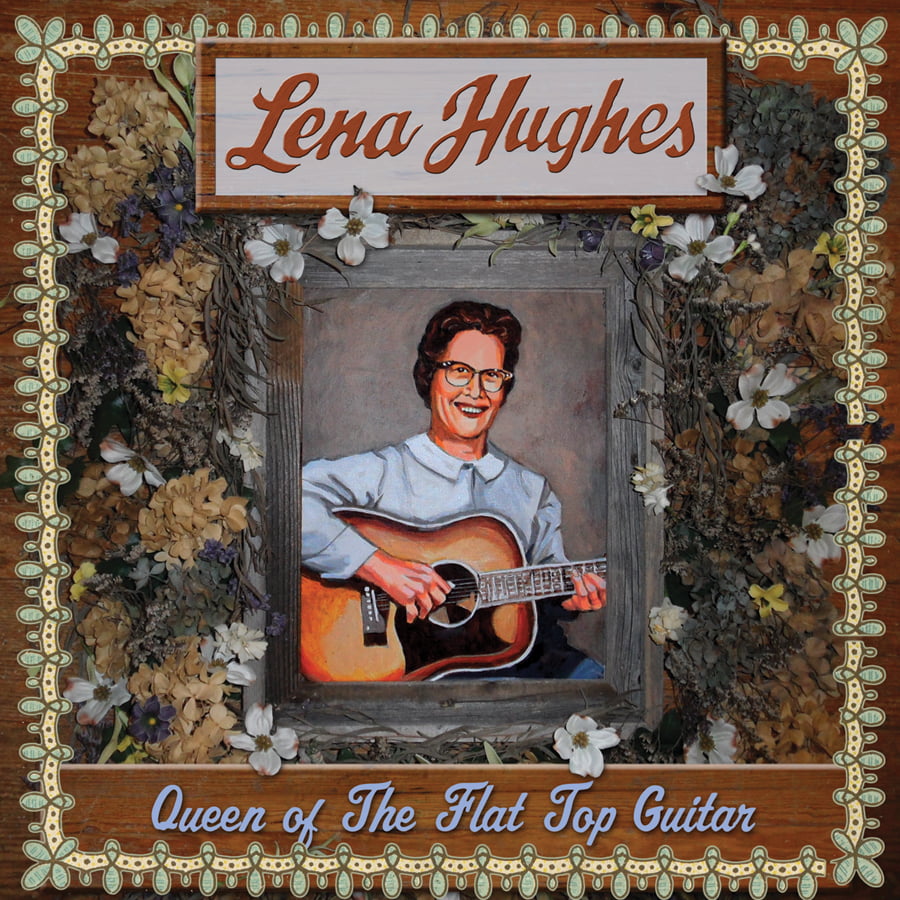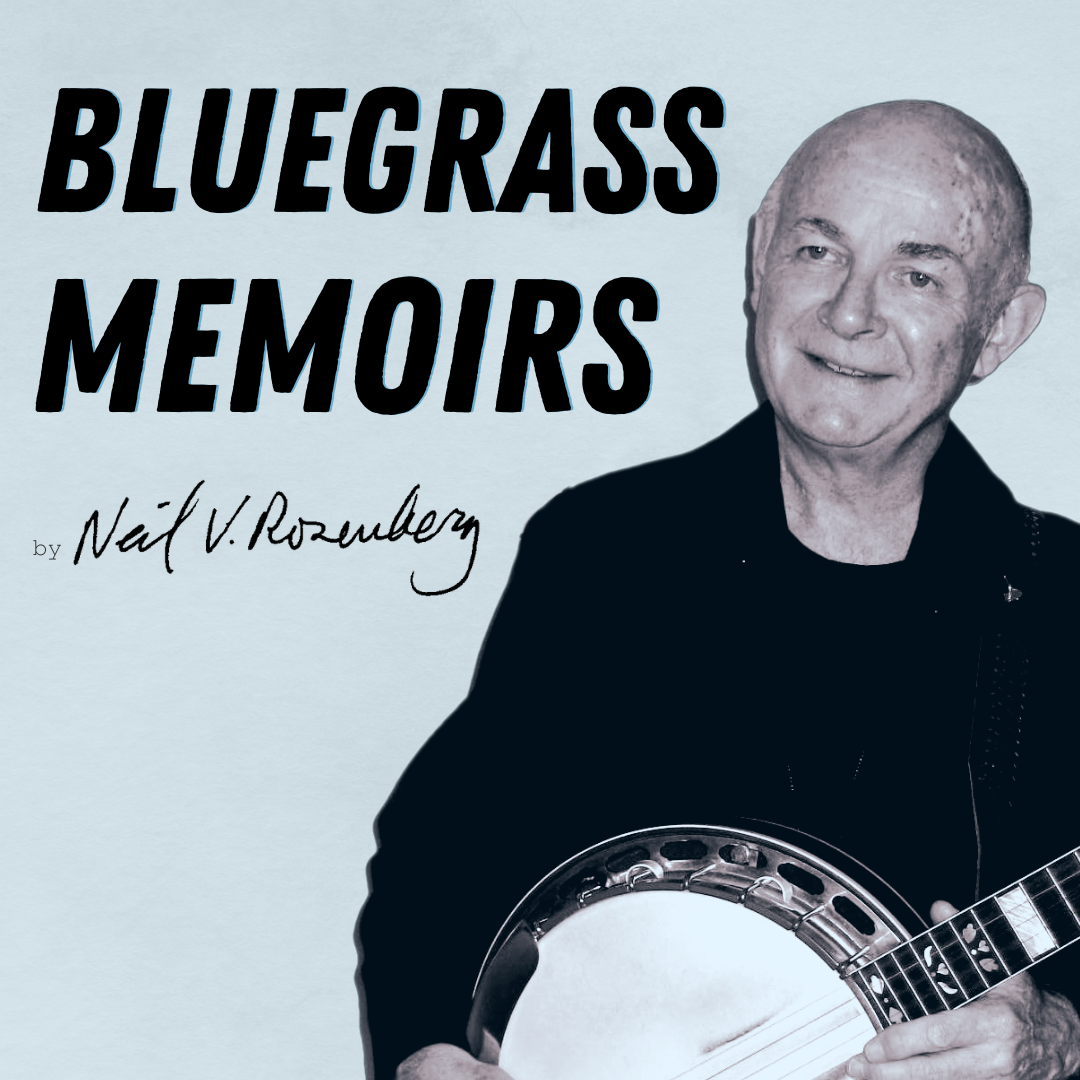Lena Hughes was born in Grape Grove Township, Missouri in 1904. Though she never recorded any 78s during her lifetime, she performed often at various fiddler conventions and folk festivals throughout the Ozarks. She played fiddle, banjo and guitar, mastering parlor pieces and the specialized tunings that were necessary to play them. She lived most of her life in Ludlow, Missouri and passed away in 1998. Lena Hughes did manage to record one full-length LP that has up until very recently, been a very elusive recording for anyone to own or even listen to.
Thanks to the Tompkins Square label, the recordings of Lena Hughes, that were originally captured in the early 1960’s in Arkansas and released only a very limited basis, is now available for collectors, as well as newcomers as Queen of the Flat-Top Guitar.
Chris King is a record collector and producer who worked on a number of amazing projects including People Take Warning! Murder Ballads & Songs of Disaster 1913-1938 box set (Tompkins Square), Amede Ardoin – Mama, I’ll Be Long Gone: The Complete Recordings of Amede Ardoin 1929-1934 (Tompkins Square), Aimer et Perdre : To Love & To Lose Songs, 1917-1934 (Tompkins Square), Charley Patton: Screamin’ and Hollerin’ The Blues (Revenant), The Bristol Sessions (Bear).
I had the pleasure of speaking with Chris for the first time, regarding his work on the Aimer et Perdre release last year. When I read that he was behind the new Lena Hughes album, I immediately reached out to Josh at Tompkins Square and to Chris to see if we could share his experiences remastering the recordings.
So it was a thrill to talk to Chris about his impressions of Lena Hughes, his work on Queen of the Flat-Top Guitar, and some very exciting details on his other upcoming projects (including releases for Jack White’s Third Man Records, Angry Mom Records, Relevant Records, and his own How The Other Half Hears imprint).
Hi Chris, it is great to speak with you again. Can you talk about your own history with Lena Hughes’ music? When and how did you discover her work?
Chris King: I first encountered Lena Hughes’ music at a small, dusty & dirty outdoor flea market in Dublin, Virginia in the late summer of 1996. I normally descended on this flea market to hunt for old 78s but I occasionally went through boxes of LPs if I thought there might be some obscure old-time string bands from Pulaski, Galax, or Patrick County lurking inside.
Sure enough, this LP was obscure but it had traveled all the way from Missouri to Virginia. So I bought it since it contained ‘old familiar tunes.’ It was only later when I started working for Dave Freeman that I learned that Charlie Faurot had recorded Hughes in the late 1960s.
What drew you most to her work and how did her recordings connect to/ inform/ etc. to others in your collection?
Chris: It is probably the completely relaxed, unselfconsciousness of her playing. It is as if I had just walked into her kitchen and she was nimbly picking out these tunes while her coffee percolated. Of course she was also playing songs and airs that I was already deeply familiar with from the old 78s.
The strange and attractive thing to me was this: she played them pure and unadorned, in a style was archaic, idiosyncratic, loving, and, above all, attentive. It is as if her papa was watching her play and nodding with approval. Maybe that is why I love it so. She’s a real throw back to the 19th century when people played not so much to get paid, but rather to entertain the family and oneself. It was just like listening to Sam McGee or Bayless Rose on the old 78s, but even more informal. Regardless, it is subtle.
How did you get involved in the project?
Chris: Well, I received a note from John Renbourn that he was desperately seeking this rare recording and wondered if I might know of where I might be able to find a copy. So that night I made a copy onto CD (imagine the novelty of making a copy of something so that it can be shared with someone without all the pretenses of ‘limited hand numbered copies’ or ‘liking it’ on Facebook). I mailed it to him.
A few days later, as I was meditating on the delusions of Vintonian megalomaniacs, I decided to listen to the record again, to give me some hope about sound and truth. I made and sent a copy of ‘Pearly Dew’ to Josh Rosenthal (of Tompkins Square Records) indicating that this was the sound of heaven. He immediately replied, wondering what it was. After a brief back and forth, we decided to put the recordings out.
How does working on this collection connect to your larger body of work (People Take Warning, Charley Patton, Aimer Et Perdre, Amede Ardoin, and more)?
Chris: It connects in two ways.
One, Lena stands as a continuum, a viable, tangible link and crossroad between the old, unvarnished artists like Patton and Ardoin, as well as more recent artists like Fahey & Rose. I have an uncompromising love of such music.
Second, she connects with the Long Gone Sound Series since her slim body of recordings poses a mystery, a problem that is worth confronting and also worth sharing.
When this LP was recorded, you of course have all this pop music that was simultaneously lining the pockets of producers like Clive Davis and decimating our musical soul. Country music in the late 1960s had become a slave to Nashville and was becoming more and more homogenized and bland. During all this, a very humble woman, steeped in a traditional music that she thought of as second nature, made arrangements to record her guitar instrumentals so that she could sell a few dozen at local fiddle contests.
She probably paid for the recording and pressing since she didn’t see that it had any commercial appeal. Such a human transaction is staggering to me but also it begs the question: ‘How can such unadulterated purity of expression escape into such a dirty world? ‘
What is most rewarding for you regarding your work as a producer, collector, and fan?
Chris: Jeez…that’s a stumper. There is so very little that is not rewarding about what I do. I have an overabundance of riches that flow from all of these activities. Perhaps I’ve reached that point of being a ‘happy man’ since it would seem unwise to complain about any aspect of what I have and what I give.
I’m engaged with some of the most creative and generous people conceivable. Susan Archie being the Tops! It is an unquestionable honor to be allowed to present these quaint yet powerful collections to anyone who wants to listen and read them, and to engage in them fully.
One thing I really enjoy about the diversity of what Josh puts out via Tompkins Square is when I get turned onto a ‘hidden treasure’ that I did not know about. And the Lena album is one that I have been playing repeatedly since I got my hands on a copy.
I enjoyed how you described Lena being at a crossroads between some of the earliest 1920s recordings and the finger-picking and American ‘primitive’ guitar work from the 1960’s. Can you provide some formal context, as well as some your insights and opinions into this span of history of guitar playing and recordings where Lena exists for new listeners?
Chris: Well, I’m no expert of American ‘Primitive’ guitar, but I do know that the direct line between the pre-war American parlor-guitar masters such as Sam McGee, Sylvester Weaver, Bayless Rose, and Lemuel Turner. They informed the taste, repertoire, and style of John Fahey, John Renbourn, Jack Rose, Basho. All those guys. What was missing from the narrative was the 35 years between these two groups. Lena is that bridge, that crossroads as it were.
Lena is also an intriguing interesting artist in that she never recorded a 78 and only one album, but established herself through performances at fiddler conventions and folk festivals. She was well versed in fiddle, banjo, and guitar, playing and keeping this music alive.
Can you discuss some of her repertoire, specifically her use of specialized tunings and song selection?
Chris: Her two best examples, “Pearly Dew” and “Spanish Fandango,” use two reasonably archaic tunings, open D & open C (respectively) to express the melodies and give them the ‘air’ they need to breath. Either tune could have been played in standard tuning given the use of gapped standard chords but they would not have the resonance or sustain they have in these open tunings. Listening to her use these tunings is a lesson in taste, personality, and perhaps history.
The artwork and packaging for the record is just beautiful. As someone who has worked in a number of fine-crafted and carefully thought out releases, what was the goal for presenting Lena Hughes to a wider audience via album art, notes, and packaging?
Chris: Respect, humbling respect. Susan Archie is a deep artist and is capable of expressing the soul of others that are long gone.
What are you doing with these collections of yours and how do you see yourself?
Chris: I’m articulating that musical medicine and nourishment is good for me, and then offering it back to others. Sort of like a panacea to cure what ails us. I see my role as a midwife for these rare and sublime sounds.
I don’t really produce anything nor do I ‘curate’. I hear what is overwhelming to my senses and then narrate what is does for me and perhaps what it could do for others. I ultimately see myself as an auricular raconteur with an uncompromising belief in a discrete yet persistent euphonic panspermia.
What’s coming up next for you? Can you share any news of some of your upcoming projects?
Chris: I have three collections that are coming out very shortly. I put together a collection of pre-war guitar instrumentals for Tompkins Square called Imaginational Anthem Vol. 6, The Roots Of American Primitive Guitar. I also re-mastered another collection for Tompkins Square of Charlie Poole’s Brunswick & Paramount Recordings, Charlie Poole & The Highlanders. Both of these are being released for Record Store Day of this year.
The third project, Five Days Married & Other Laments: Song & Dance From Northern Greece, 1928-1958, is a collection of otherworldly, deeply meditative and profoundly unhinged music from Southern Albania and Northern Greece. It continues in the same vein as my other collections that simultaneously explore certain music and a certain philosophical question. This is on Angry Mom Records, via my imprint How The Other Half Hears, and will be available April 30th of this year.
Also, I’m working on three projects for my imprint Long Gone Sound Series, for Tompkins Square. Two of these concern early pre-war Cajun music. One is a two-disc collection of songs by Joe & Cleoma Falcon and the Breaux Family, all recorded before 1941.
The other is called Let Me Play This For You, a collection of most of the surviving sides by Angelas LeJeune, Babineaux & Guidry, and Blind Uncle Gaspard. My friend Ron Brown wrote the notes and then we together supplied most of these vexingly rare, beautiful and, at times, profoundly sad records.
The third project is When I Reach That Heavenly Shore, a three-disc collection of pre-war black sanctified music that implies an eventual musical eschatology. All three of these projects for Tompkins Square will be released later.
A four CD box set called Beyond Rembetika: The Music & Dance of The Region Of Epirus, 1919-1958, will be released on May 6th of this year and features 96 tracks from 78 disc of material from Southern Albania/Northern Greece. This is on JSP Records. Commenting on this collection, my friend Crowmeat Bob said ‘It’ll blow the lid off this whole thing. ‘
I am re-mastering and overseeing the sonic care and aural presentation for two colossal box sets for Revenant Records/Third Man Records. They are the Rise Of Paramount Records and the Fall Of Paramount Records, and each set will contain upwards of 800 tracks of blues, jazz, hillbilly, sacred, ethnic, and dance music as recorded by and issued on the legendary Paramount label. The first volume will be issued later this year.
Finally, I’m sewing up the notes and polishing the sound on a collection of hypnotic and staggeringly powerful fiddle masterpieces by the Greek pre-war master, Alexis Zoumbas. This will be out in the fall on Angry Mom Records, on my How The Other Half Hears imprint.
What have you been listening to/ collecting lately that you have been most excited about?
Chris: Well, besides the obvious stingers that I can’t shake out of my head, I’ve been listening to a lot of 78s recorded ‘in the field,’ i.e., on portable disc and tape machines, of Southern Albanian and Northern Greek musicians from the 1940s to the 1970s. Even though this music is startling in its immediacy and purity, what really intrigues me is how unchanged the music is from the 1910s until right now!
So, we’re going to Northern Greece this summer to record some traditional clarinet, violin & laouto groups in Vitsa, and then next spring I’m going to Southern Albania to record a range of various Albanian groups. I am hoping that these field recordings can be blended with recordings from my 78 collection for a set in the future. Also been listening to a lot of ODB recently.






